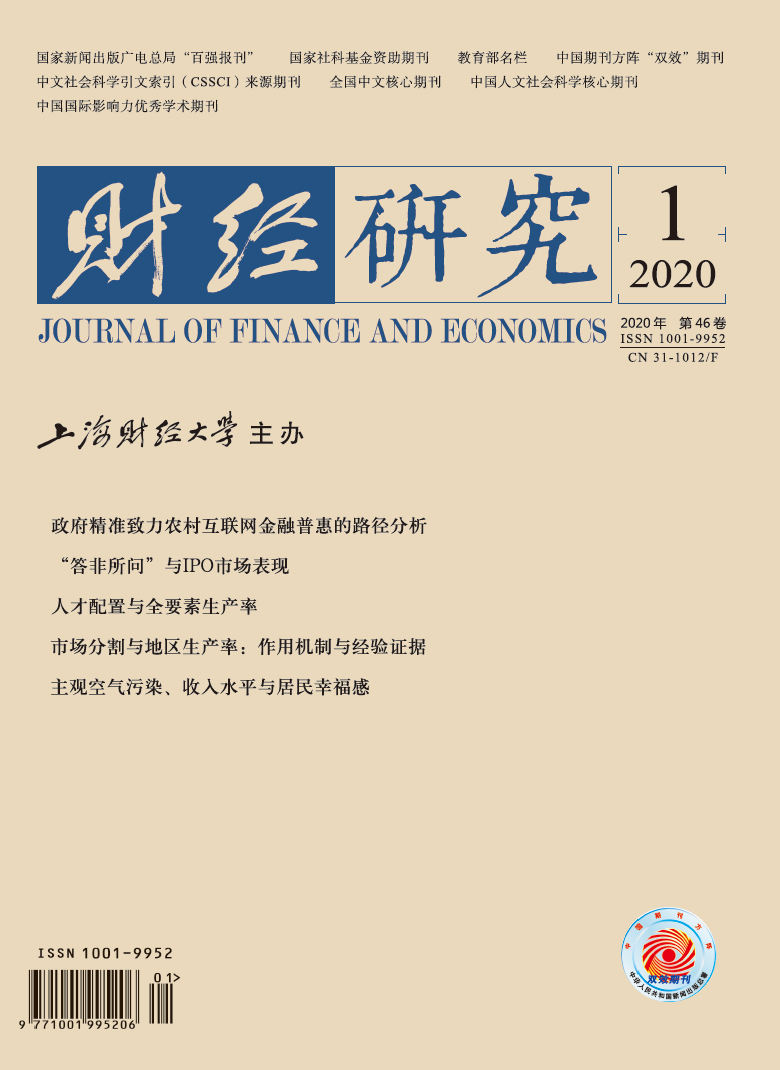大多数国家的经济发展经历表明,经济增长与居民幸福感之间存在着一种倒“U”形关系,即居民收入水平达到一定程度之后,人们的幸福感不仅不会上升,反而可能会下降,这就是所谓的“伊斯特林悖论”。文章利用2016年中国劳动力动态调查数据(CLDS),从收入和居民主观空气污染角度对该悖论进行了解释。首先,不同收入水平的居民对环境污染的敏感程度是不同的。收入水平越高,居民对空气污染越敏感,因此主观空气污染越严重。其次,收入水平越高,环境污染对居民幸福感的负面影响越大。这是因为不同收入水平的居民对环境的要求是不同的,高收入者对环境有更高要求;而对于低收入者来说,他们更倾向于通过经济发展提高收入水平,对经济发展带来的环境污染问题则关注不够。因此,在我国全面建成小康社会以后,在提高居民收入水平的同时,更应该关注人民群众对美好生活的追求,特别是要协调好不同收入群体对美好生活的异质性需求,从而提高我国居民的整体幸福感。
主观空气污染、收入水平与居民幸福感
摘要
参考文献
6 李培林. 怎样界定中等收入群体更准确[N]. 北京日报, 2017-07-17(14).
7 罗楚亮. 绝对收入、相对收入与主观幸福感−来自中国城乡住户调查数据的经验分析[J]. 财经研究,2009,(11):79−91. DOI:10.3969/j.issn.1001-9952.2009.11.008
13 张迎春,周子堰,陈枫,等. 国内购买力平价构建及物价水平研究[J]. 统计与信息论坛,2019,(3):9−17. DOI:10.3969/j.issn.1007-3116.2019.03.002
14 Davis J J. Riskier than we think? The relationship between risk statement completeness and perceptions of direct to consumer advertised prescription drugs[J]. Journal of Health Communication,2000,5(4): 349−369. DOI:10.1080/10810730050199141
15 Di Tella R,MacCulloch R. Gross national happiness as an answer to the Easterlin Paradox?[J]. Journal of Development Economics,2008,86(1): 22−42. DOI:10.1016/j.jdeveco.2007.06.008
16 Diekmann A,Franzen A. The wealth of nations and environmental concern[J]. Environment and Behavior,1999,31(4): 540−549. DOI:10.1177/00139169921972227
17 Diener E,Seligman M E P. Beyond money:Toward an economy of well-being[J]. Psychological Science in the Public Interest,2004,5(1): 1−31. DOI:10.1111/j.0963-7214.2004.00501001.x
18 Direnfeld D M,Roberts J E. Mood congruent memory in Dysphoria:The roles of state affect and cognitive style[J]. Behaviour Research and Therapy,2006,44(9): 1275−1285. DOI:10.1016/j.brat.2005.03.014
19 Easterlin R A. Does economic growth improve the human lot? Some empirical evidence[A]. David P A, Reder M W. Nations and households in economic growth[C]. New York: Academic Press, 1974.
20 Ferrer-i-Carbonell A. Income and well-being:An empirical analysis of the comparison income effect[J]. Journal of Public Economics,2005,89(5-6): 997−1019. DOI:10.1016/j.jpubeco.2004.06.003
21 Foo M D. Emotions and entrepreneurial opportunity evaluation[J]. Entrepreneurship Theory and Practice,2011,35(2): 375−393. DOI:10.1111/j.1540-6520.2009.00357.x
22 Graham C,Pettinato S. Happiness,markets,and democracy:Latin America in comparative perspective[J]. Journal of Happiness Studies,2001,2(3): 237−268. DOI:10.1023/A:1011860027447
23 Gu D,Huang N W,Zhang M X,et al. Under the dome:Air pollution,wellbeing and pro-environmental behavior among Beijing residents[J]. Journal of Pacific Rim Psychology,2015,9(2): 65−77. DOI:10.1017/prp.2015.10
25 Levinson A. Valuing public goods using happiness data:The case of air quality[J]. Journal of Public Economics,2012,96(9-10): 869−880. DOI:10.1016/j.jpubeco.2012.06.007
26 Li Z T,Folmer H,Xue J H. To what extent does air pollution affect happiness? The case of the Jinchuan mining area,China[J]. Ecological Economics,2014,99: 88−99. DOI:10.1016/j.ecolecon.2013.12.014
28 Luechinger S. Valuing air quality using the life satisfaction approach[J]. The Economic Journal,2009,119(536): 482−515. DOI:10.1111/j.1468-0297.2008.02241.x
29 MacKerron G,Mourato S. Life satisfaction and air quality in London[J]. Ecological Economics,2009,68(5): 1441−1453. DOI:10.1016/j.ecolecon.2008.10.004
30 Mangyo E. The effect of water accessibility on child health in China[J]. Journal of Health Economics,2008,27(5): 1343−1356. DOI:10.1016/j.jhealeco.2008.04.004
31 Rehdanz K,Maddison D. Local environmental quality and life-satisfaction in Germany[J]. Ecological Economics,2008,64(4): 787−797. DOI:10.1016/j.ecolecon.2007.04.016
32 Riddel M,Shaw W D. A theoretically-consistent empirical model of non-expected utility:An application to nuclear-waste transport[J]. Journal of Risk and Uncertainty,2006,32(2): 131−150. DOI:10.1007/s11166-006-8290-0
33 Shaw W D,Woodward R T. Why environmental and resource economists should care about non-expected utility models[J]. Resource and Energy Economics,2008,30(1): 66−89. DOI:10.1016/j.reseneeco.2007.05.001
34 Smyth R,Mishra V,Qian X L. The environment and well-being in urban China[J]. Ecological Economics,2008,68(1-2): 547−555. DOI:10.1016/j.ecolecon.2008.05.017
35 Van Praag B M S,Baarsma B E. Using happiness surveys to value intangibles:The case of airport noise[J]. The Economic Journal,2005,115(500): 224−246. DOI:10.1111/j.1468-0297.2004.00967.x
36 Welsch H. Preferences over prosperity and pollution:Environmental valuation based on happiness surveys[J]. Kyklos,2002,55(4): 473−494. DOI:10.1111/1467-6435.00198
37 Welsch H. Environment and happiness:Valuation of air pollution using life satisfaction data[J]. Ecological Economics,2006,58(4): 801−813. DOI:10.1016/j.ecolecon.2005.09.006
38 Yuan L,Shin K,Managi S. Subjective well-being and environmental quality:The impact of air pollution and green coverage in China[J]. Ecological Economics,2018,153: 124−138. DOI:10.1016/j.ecolecon.2018.04.033
39 Zhang X,Zhang X B,Chen X. Happiness in the air:How does a dirty sky affect mental health and subjective well-being?[J]. Journal of Environmental Economics and Management,2017,85: 81−94. DOI:10.1016/j.jeem.2017.04.001
引用本文
叶林祥, 张尉. 主观空气污染、收入水平与居民幸福感[J]. 财经研究, 2020, 46(1): 126-140.
导出参考文献,格式为:
上一篇:企业债券融资与劳动收入份额
下一篇:供应链金融与企业专业化分工





 7843
7843  8063
8063

